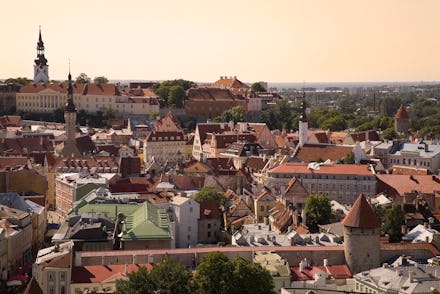If You Live in This Country, You'll Have Free WiFi Access Everywhere You Go

Most of us are lucky enough to take Internet access for granted. Sure, you'll make sure the cafe you're heading to has WiFi and remember to pay the bill on time, but it is easy to forget that convenient and fast access to the Internet is a prerequisite for just about every task necessary to being a functioning member of society these days, let alone full freedom of expression.
Despite all of this, the Internet access provision in the U.S. is falling behind other countries. Estonia has a far, far lower GDP and yet offers free WiFi pretty much everywhere. And America has a long way to go to catch up.
In 2011 the UN declared Internet access is a human right, and that limiting a person's access to the Internet is a violation of their human rights under international law. The report also focused on the importance of maintaining Internet service during times of political unrest, as social media was increasingly used as a means of mobilization.
Image Credit: Getty Images
In Estonia's parks, squares, airports, restaurants and even forests you are likely to be able to connect to a free WiFi hotspot. This access-for-all-attitude to being online has profoundly changed the psyche of this small Eastern European country.
"e-Estonia" is how its government describes its relationship with the digital world, calling the country "one of the most advanced e-societies in the world — an incredible success story." Estonia ranks 24th in the Networked Readiness Index and is the highest-ranking Central and Eastern European country.
People visit Estonia to learn about how the country has embraced digital technology through the country's e-Governance Academy. Visitors are from Canada, Japan, Georgia, India, Namibia and Pakistan. The U.S. isn't on the list.
In the U.S., Internet access is a product in the marketplace like any other. One in five American homes don't have Internet access, and those homes are likely to belong to the poor and less educated. Fears over equal access to information online have become public conversation following an FCC ruling that a small number of Internet providers can have an increasing monopoly over providing online information.
"We seem to currently assume that communications access is a luxury, something that should be entirely left to the private market unconstrained by any form of oversight," law professor Shannon Crawford told NPR earlier this year. If the U.S. doesn't change this attitude, Crawford fears the country will fall behind countries like Estonia in terms of innovation.
"It's a real risk to the country not to be the place where new ideas come from. That's always been our advantage as an entrepreneurial, individualistic society," she said.
There's no doubt that the U.S. has a steep mountain to climb if it is to be known as "e-America" anytime in the near future. Estonia has a land mass of 17,500 square miles; America is nearly 4 million square miles, and it'll take a lot of hotspots to cover that ground.
U.S. legislators must fight the high costs of going online — but it's a battle that will only be won if they can actually stand up to corporations. Sadly, that might not be any time soon. The FCC recently ruled that Internet service providers can provide faster streaming to websites willing to pay for it, and many saw this as the government crumbling in the face of the markets, yet again.
Comedian John Oliver skewered the FCC for the decision — rallying 450,000 viewers to lodge their complaints to the regulatory body — since it "would allow big companies to buy their way into the fast lane, leaving everyone else in the slow lane."
But tough task or not, the U.S. needs to act fast to stay ahead in digital innovation. And adopting Estonia's approach to Internet access would be a good start.